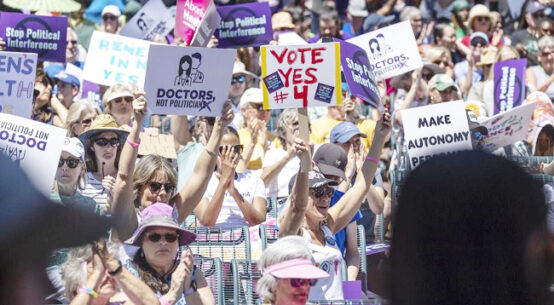The radicalised Taliban after recapturing Afghanistan in August 2021, the regime has promulgated a series of misogynist decrees which targeted women only.
Women are barred from higher education, jobs and business. The Islamic Emirate of Afghanistan issued nearly 20 decrees against women during the last one and a half years inviting global outcry. The
International Women’s Day on 8 March is observed worldwide, but Afghanistan is the world’s most repressive country for women and girls, deprived of their basic rights, said the United Nations.
Despite the dark clouds over Afghanistan, there is two good news on an international day.
First, Afghan broadcaster Tolo News aired an all-female panel in its studio with an audience of women to mark International Women’s Day, a rare broadcast since the Taliban took over the vibrant country, reports BBC.
Second, despite the strict enforcement of protests, the women held a protest in Kabul on International Women’s Day, calling for women’s access to education and work. The protestors called for the removal of blanket restrictions on women in Afghanistan.
Since 1908 International Women’s Day’s thematic colour purple stands for dignity and justice, green for hope, and white for purity. Purple is the colour of women’s empowerment and gender equality, which the Taliban hates to listen to.
Tolo News to mark the auspicious day held a discussion session. The panel of three women and one female moderator with surgical masks covering their faces discussed the topic of the position of women in Islam. Taliban is not prepared to hear a sermon on Islam from a woman.
International media rights defender Reporters Without Borders (RSF) is aghast that the Taliban has continued to erase women journalists from the media landscape in Afghanistan.
In less than two years. Half of the 526 media outlets that existed until the summer of 2021 have had to close and, of the 2,300 women journalists since the Taliban takeover in August 2021, fewer than 200 are still working. Almost all of the women journalists (90%) have had to leave their jobs and some have fled the country, although exactly how many have managed to flee is not known.
Those still working must accept conditions that are becoming more and more draconian if not impossible. The Taliban Ministry for the Promotion of Virtue and Repression of Vice has also imposed a strict dress code. When women journalists are on camera, they must be covered from head to toe and only their eyes may be seen.
The female protestors issued a statement saying the current challenges against women should not be forgotten.
“It is March 8 but women in Afghanistan have no right to celebrate this day. We are the women who are imprisoned in the country. The restrictions are worsened day-by-day,” said Jolia Parsa, a member of Junbish Itlaf Khodjosh Zanan.
The protesters appealed to the international community to pay attention to the situation of women in Afghanistan.
“Today, the gates of gyms, schools, universities and parks have been closed for women,” said a member of Junbish Itlaf Khodjosh Zanan.
The UN Secretary-General António Guterres laments that women and girls “are erased from public life” in Afghanistan.
On the other hand, hopes are dashed as universities reopen after a winter vacation, but it’s another painful reminder to young women of how their world is shrinking.
Due to growing restrictions as well as the country’s severe economic crisis, the International Labour Organisation (ILO) said female employment had fallen 25 per cent last year since mid-2021. It added that more women were turning to self-employed work such as tailoring at home.
The United Nations Mission to Afghanistan called on the Taliban to reverse restrictions on the rights of girls and women, calling them “distressing.”
The Taliban have said the authorities have set up a committee to examine perceived issues to work towards re-opening girls’ schools. But there is no light at the end of the tunnel.
The Islamic Emirate has repeatedly said that they are committed to the rights of women and girls in Afghanistan and that their rights are preserved within strict Islamic Sharia laws.
Saleem Samad, is an award-winning independent journalist, media rights defender, recipient of Ashoka Fellowship and Hellman-Hammett Award. He could be reached at <saleemsamad@hotmail.com>; Twitter @saleemsamad

